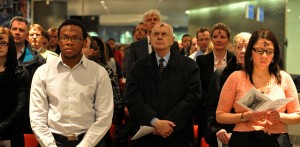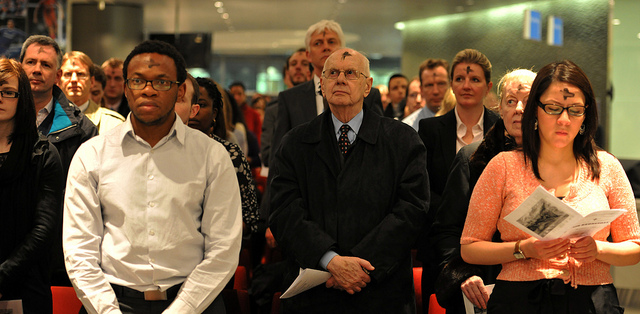In the first reading of the Ash Wednesday liturgy that we celebrated last week, the prophet Joel declares:
Blow the trumpet in Zion!
proclaim a fast,
call an assembly;
Gather the people,
notify the congregation;
Assemble the elders,
gather the children
and the infants at the breast;
Let the bridegroom quit his room
and the bride her chamber.Between the porch and the altar
let the priests, the ministers of the LORD, weep,
And say, “Spare, O LORD, your people,
and make not your heritage a reproach,
with the nations ruling over them!
Why should they say among the peoples,
‘Where is their God?’” (Joel 2:15-17, NAB)
The passage is striking because as Catholics we normally think of repentance as something we do individually, and yet Joel is calling on the people of Israel to a collective repentance. Now obviously this passage is read to call to mind the Church itself gathering together for Lent, the season of repentance, but even then in the midst of the congregation we often simply recollect our own individual sins, confessing them in the sacrament of reconciliation.
In Joel, however, the people are being called together to confess the sins of the community as a whole. Oddly, Joel is never clear of what the people of Israel need to repent; in chapter 1, we see that Israel has suffered from a plague of locusts, which they fear foreshadows the “day of the Lord,” God’s wrathful judgment on their unfaithfulness. If the denunciations of the other prophets of the Old Testament are any indication, however, the Israelites were likely guilty of oppressing the poor and vulnerable in their midst, and this communal liturgy of lament is calling them to greater faithfulness to God’s expectations of mercy toward the poor.
 It just so happened that as we celebrated this Ash Wednesday liturgy, in one of my classes we were reading Bryan Massingale, S.J.’s Racial Justice and the Catholic Church. In this book, Massingale proposes the lament as one powerful Christian response to the evils of racism. He speaks of the lament as the anguished cry of the oppressed to God, a rejection of injustice yet a realistic hope in God’s justice, and he suggests African-American spirituals and poetry as examples. Massingale also proposes a second type of lament, that of the privileged who recognize their own participation in the suffering of the oppressed. This latter seems to be the sort of lament to which Joel is calling Israel.
It just so happened that as we celebrated this Ash Wednesday liturgy, in one of my classes we were reading Bryan Massingale, S.J.’s Racial Justice and the Catholic Church. In this book, Massingale proposes the lament as one powerful Christian response to the evils of racism. He speaks of the lament as the anguished cry of the oppressed to God, a rejection of injustice yet a realistic hope in God’s justice, and he suggests African-American spirituals and poetry as examples. Massingale also proposes a second type of lament, that of the privileged who recognize their own participation in the suffering of the oppressed. This latter seems to be the sort of lament to which Joel is calling Israel.
This juxtaposition of readings led me to re-think something I had written for this blog several months ago. In the post “I Want to Be Dependent,” I critiqued the myth of self-reliance in American culture, pointing out the many ways we are dependent on one another, and ultimately on God. The myth of self-reliance leads to an attitude of entitlement, either to what one has or to what one desires. In its place I proposed gratitude and self-giving, reimagining human action to avoid the opposition between initiative and dependence central to the myth of self-reliance.
In contrast, as I read Racial Justice and the Catholic Church, I considered the ways in which I, as a white American, benefit from the persistent structural racism of U.S. society. When I buy a house without thinking about how my race might affect the terms of my mortgage, or when I can drive down the street without worrying about being pulled over for a pile of snow covering one of the letters on my license plate, is the appropriate response gratitude? Likewise, as a man, when I can feel confident that my scholarly expertise will not be called into question because of my sex, should I be thankful? As a volunteer coordinator in Honduras several years ago, I was often bothered when American volunteers who came to serve the poor walked away “thankful for the things I have that others do not,” ignoring the way their own having and others’ poverty might be linked. Although I still agree that gratitude is the fundamental human posture, I realize now this is incomplete.
There is in fact significant overlap between the posture of gratitude and the questioning of unjust privilege. In my earlier post I wrote:
The autonomous self feels entitled to what it has, believing it is responsible for their possession, while ignoring what it has received. Likewise, the autonomous self resents the claims of the less fortunate other, believing the latter’s misfortune stems from its own failures. The autonomous self can be ingenious in devising rationales for its advantages over others…
Similarly, in his book Racism Without Racists, the scholar Eduardo Bonilla-Silva describes the phenomenon of “color-blind racism,” which explains the persistence of structural racism despite the decline of overt, discriminatory racism. Bonilla-Silva outlines the “frames” through which the majority of white Americans interpret reality that mask the advantages they receive from structural racism. Among the most important of these is what he calls “abstract liberalism”, in which life conditions are attributed solely to individual effort and choice. “Blacks wouldn’t be so poor if they would just work harder,” and “It would be nice if we lived in more integrated neighborhoods, but you have to respect people’s choices,” are examples of “abstract liberalism” since they ignore the structural injustices of race that are not chosen and that limit the possibilities of individual effort.
At our birth we are thrown into a world we receive as a gift, but that world is marked by hierarchies and inequalities that render it unjust. As I noted, “it is impossible to disentangle what we do from what happens to us, the ways in which we are in control and the ways we are determined,” and as someone who is relatively privileged, it is also difficult to disentangle that which we should accept with gratitude from the unjust privileges we should renounce or challenge. Of course, this is not to say that we should not vigorously analyze structural racism and identify specifically how it benefits whites while disadvantaging racial minorities, but rather that in the life of an individual person, things are not entirely clear cut.
To me this suggests that, gratitude and lament stand in a dynamic relationship as the fundamental postures of the Christian. Yes, we must give thanks for the relationships and communities that have formed us, and for our very existence, but we must also lament that we share in the benefits of these gifts unequally for deeply unjust reasons. Both gratitude and lament draw forth the same response, however, of self-giving, of dispossession; our possessions, achievements, and ultimately our lives themselves are not our own, but rather must be given away to contribute to a society in which every human life is received as a gift.
In the season of Lent, we are called to prayer, fasting, and almsgiving. As we gather together the people of God, let our prayer be one of thanksgiving for our blessings and one of lament for our suffering, or for our participation in the suffering of others. Let our fasting keep us mindful of our own abundance, of how others must unwillingly go without, and of how the two are related. And let us give our whole selves as alms.



